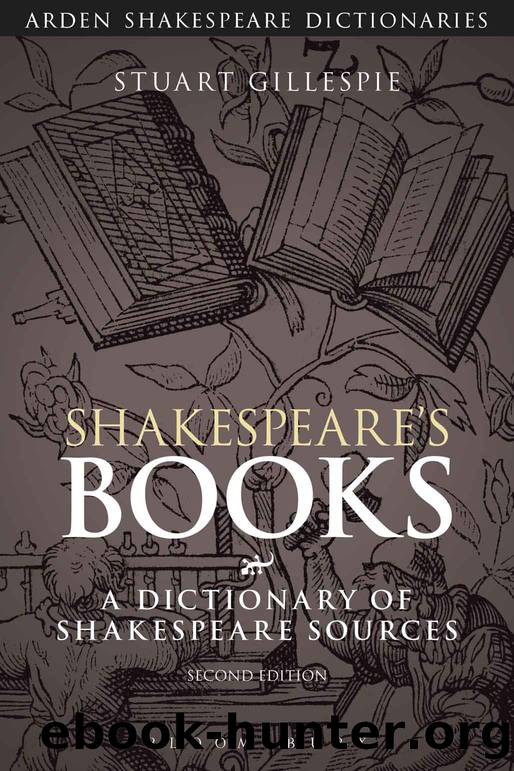Shakespeare's Books by Gillespie Stuart.;

Author:Gillespie, Stuart.; [GILLESPIE, STUART]
Language: eng
Format: epub
ISBN: 9781474216067
Publisher: Bloomsbury UK
Published: 2015-12-02T16:00:00+00:00
If we wey both profytte and delectation Lambinus wrote truly, emongst latin poetes Horace hath not his felowe. This is he whome great Augustus writte shoulde be loked to as him selfe, whom Maecenas loved as himselfe, ripe, pythye, excellent for moral preceptes, full of pretye speaches, full of Judgement.
(Drant 1567: sig. *3v; roman for italic)
In Renaissance Europe as a whole, the Satires and Epistles were translated entire three times as often as the Odes and Epodes. Drant’s Horace was to be the last large-scale English translation for some seventy years, though less ambitious attempts in the interim included a partial version of the Ars poetica by Queen Elizabeth herself.
Horace was an unavoidable presence in the education of the literate classes of the English Renaissance, but how far was this matched by his presence in the work of English writers? Before Shakespeare’s time he had been in this respect too the poet of the Satires and Epistles for a few pioneers, notably Sir Thomas Wyatt, whose own epistolary satires, though not translations of Horace’s, are inconceivable without them. Sidney is the first English poet to translate a Horatian Ode (II.10, as ‘You better sure shall live’, late 1570s) in such a way as to create an independent English poem, but lesser talents were at a loss for the style and sophistication required. It was Ben Jonson who first, and influentially for later generations, made use of the full range of Horace’s work. His creative imitations naturalized it in such poems as ‘To Penshurst’, ‘To Sir Robert Wroth’, and ‘Inviting a Friend to Supper’. His translations too (several Odes and Epodes, Satire I.9, Ars poetica), as well as his deliberate modelling of his poetic personality on Horace’s, helped earn him the name of ‘the English Horace’. It was in the early seventeenth century that Horace came to be felt as important a lyric poet as a satirist, indeed the ‘prince of lyrics’; but Jonson’s Horace also commanded respect as a moralist:
Download
This site does not store any files on its server. We only index and link to content provided by other sites. Please contact the content providers to delete copyright contents if any and email us, we'll remove relevant links or contents immediately.
Still Me by Jojo Moyes(11266)
On the Yard (New York Review Books Classics) by Braly Malcolm(5525)
A Year in the Merde by Stephen Clarke(5430)
Eleanor Oliphant Is Completely Fine by Gail Honeyman(5282)
The Bookshop by Penelope Fitzgerald(3853)
How Music Works by David Byrne(3270)
Surprise Me by Kinsella Sophie(3113)
Pharaoh by Wilbur Smith(2993)
Why I Write by George Orwell(2954)
A Column of Fire by Ken Follett(2613)
Churchill by Paul Johnson(2587)
The Beach by Alex Garland(2560)
The Songlines by Bruce Chatwin(2555)
Aubrey–Maturin 02 - [1803-04] - Post Captain by Patrick O'Brian(2306)
Heartless by Mary Balogh(2259)
Elizabeth by Philippa Jones(2205)
Hitler by Ian Kershaw(2198)
Life of Elizabeth I by Alison Weir(2086)
Harry Potter and the Cursed Child by J. K. Rowling & John Tiffany & Jack Thorne(2064)
